As Head of Fujitsu Central & Eastern Europe, Rupert Lehner is responsible for around 5,000 employees in Germany, Austria and Switzerland as well as Russia and Poland. With J-BIG, he talked about Fujitsu’s German and Japanese history, the current state of affairs in times of COVID-19, and his plans for the company’s future.

J-BIG: Mr. Lehner, the history of Fujitsu has numerous ties with Germany. How did this come about?
Rupert Lehner: Fujitsu may be a Japanese company, but a very close connection with Siemens existed from the very start. Fuji Tsushinki Seizo, as the company was then called, was formed in 1935 out of a joint venture with the German corporation. “Fuji” in this case did not refer to the famous mountain, but was composed of Furukawa and Jimensu, the Japanese pronunciation of Siemens. In 1999, the joint venture Fujitsu Siemens Computers was created – the Siemens shares were then transferred to Fujitsu in 2009.
When Siemens decided to sell the shares, discussions arose about what this meant for us. Would Siemens disappear completely from the Fujitsu identity? I have always held the opinion that this is not even possible. The close relationship and shared past of the two companies is forever enshrined in the name, the „ji“, in Fujitsu.
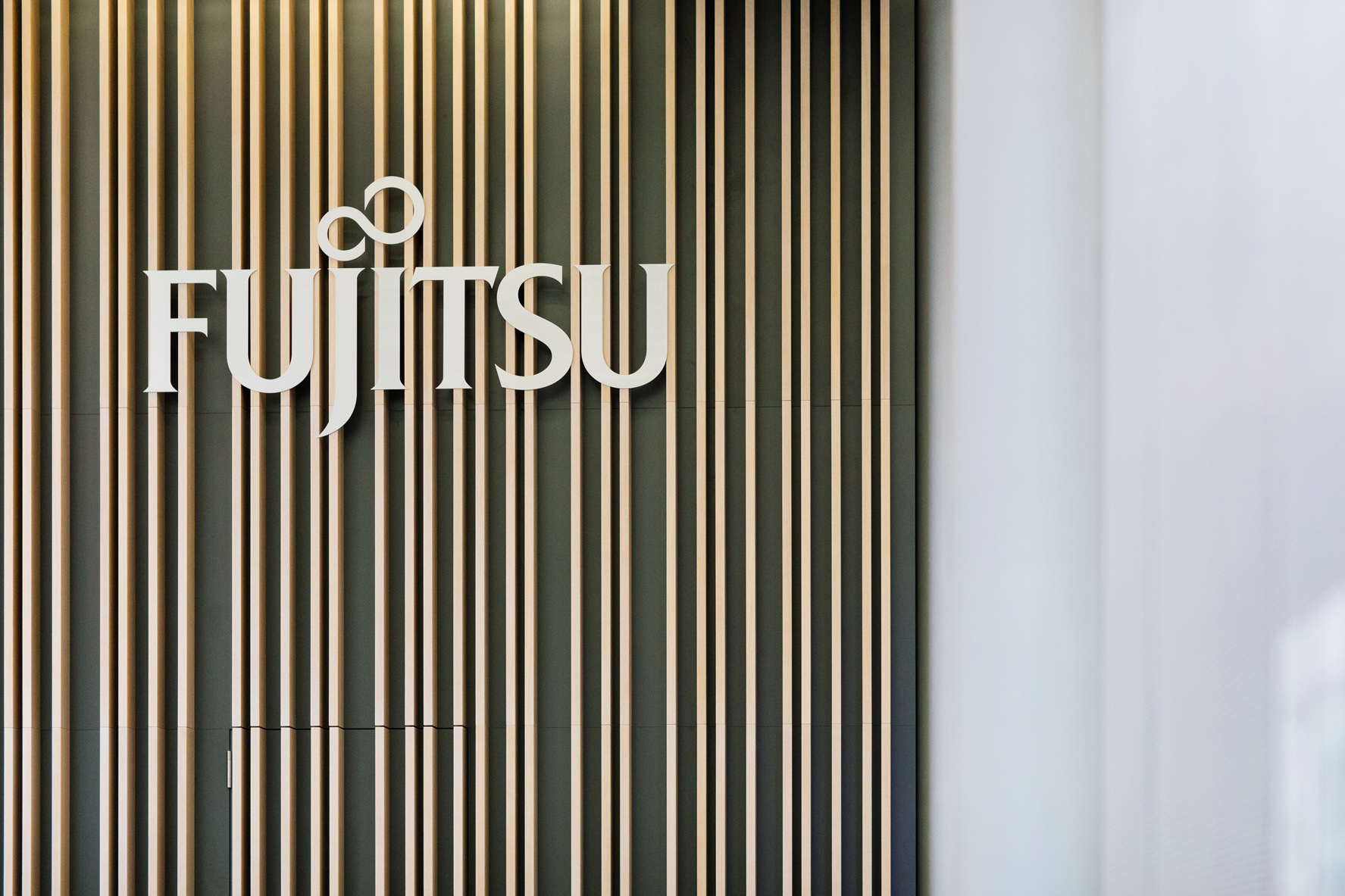
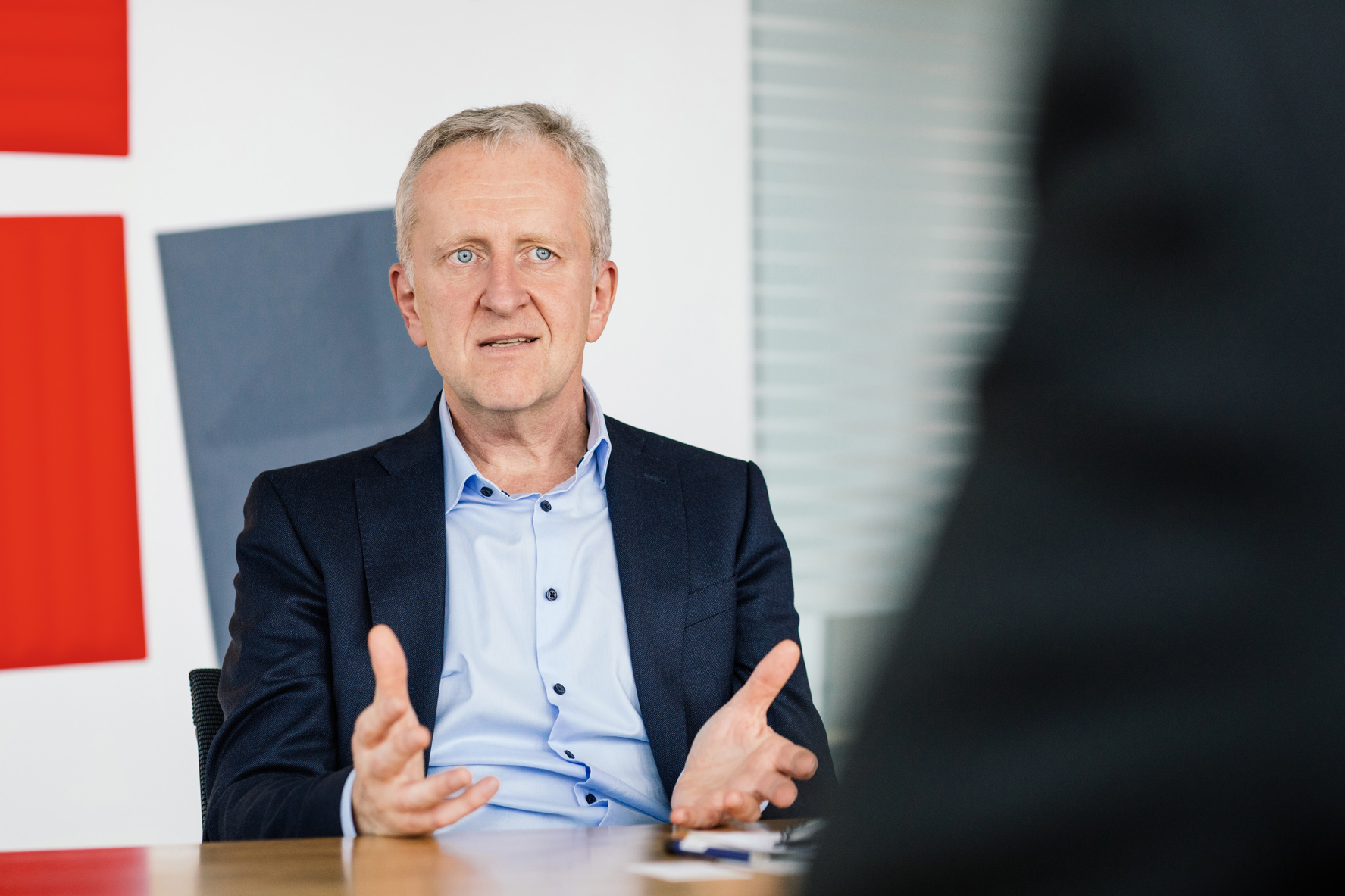
J-BIG: What role do Europe – and especially Germany – play at Fujitsu today?
Rupert Lehner: The bottom line is this: Fujitsu is a global company with strong roots in Japan. Of its approximately 135,000 employees, about 100,000 work in Japan, and about 20,000 live and work in Europe. Within the European market, Germany is a very important country, also in terms of the number of people currently working for Fujitsu – around 4,500. In addition, we also have a relatively strong presence in the UK and in Ireland, and Finland is an important market in Scandinavia.
Free Subscription
“J-BIG – Japan Business in Germany” is the e-mail magazine dedicated to Japanese companies and their business activities in the German market.
J-BIG: What do you consider focus areas for the future?
Rupert Lehner: Since its foundation, Fujitsu has been a very technology-driven, hardware-oriented company with product business. Coming from this strong tradition, we have increasingly shifted our focus towards the solutions and services business. Our goal is to play a significant role in shaping digitalization.
An important future topic, which some readers are probably familiar with from the media, is supercomputers. They are used for scientific research at universities, for example. In this field, we have been at the forefront of development right from the start. Together with the Japanese research institute RIKEN, we developed the world‘s currently most powerful supercomputer, the Fugaku. And here in Germany, we signed a contract with the University of Regensburg just this year. The scientists there use the processor technology developed for Fugaku toresearch the “big bang”, among other things.
Another visionary topic for us is the field of quantum computing. Here, we have developed a bridging technology called „Digital Annealing“. It uses the same approaches as quantum computing and can already be used today – with significantly more computing power than the processors currently available on the market. At the moment, we are working with various German companies from the automotive industry, logistics and telecommunications, which use the technology in the context of 5G, for example.
In the services field, we are pushing both end-user services and data center services. Basically, this involves the operation of data centers for customers, both on premise at the customer‘s facilities and in the form of outsourcing. In addition, we recently established the Fujitsu Service Hub, a new platform which will provide our customers with highly standardized and automated services. This ranges from SAP services to user support: Imagine that an error occurs on your laptop or desktop. In the past, you had to call a service center and hope that someone there could help you. With our Service Hub, the majority of these problems can be solved fully automated. The customers don’t have to be put on hold or wait for a call back. With this offer, we are currently leading the market, as our partners and customers confirm.
J-BIG: Do you recognize different trends in the Japanese and German markets in terms of your portfolio?
Rupert Lehner: In general, we have a global portfolio, but there are regional differences in how we offer these solutions to our customers. The Japanese market is still very closed, and there is a relatively high level of customization – solutions are adapted to individual needs. In Europe, there is a much higher degree of standardization. Solutions for the Japanese market therefore sometimes have to be adapted for the European market, and vice versa. We now have processes in place that allow us to also incorporate the learnings from the European market into developments in Japan.
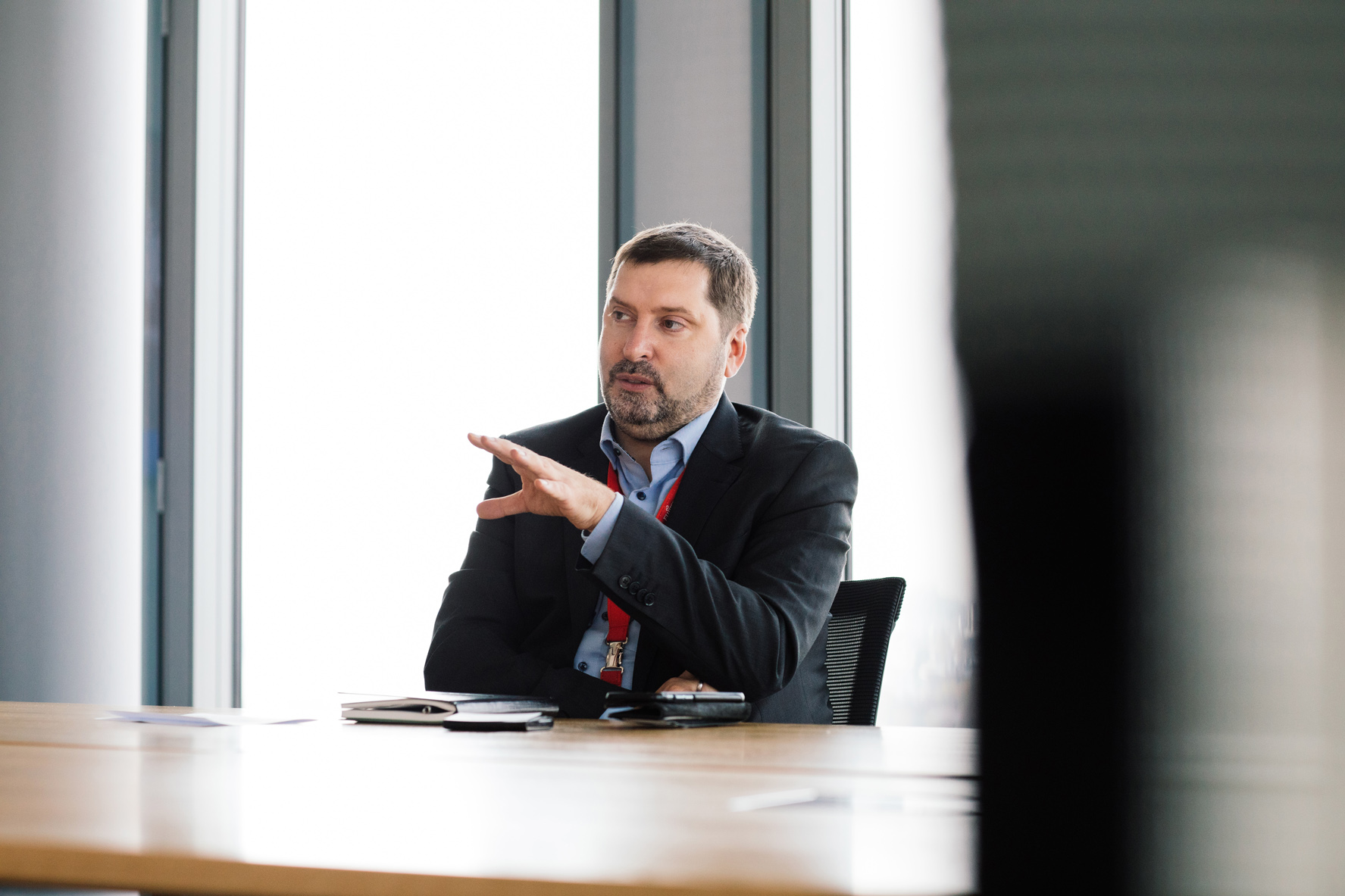
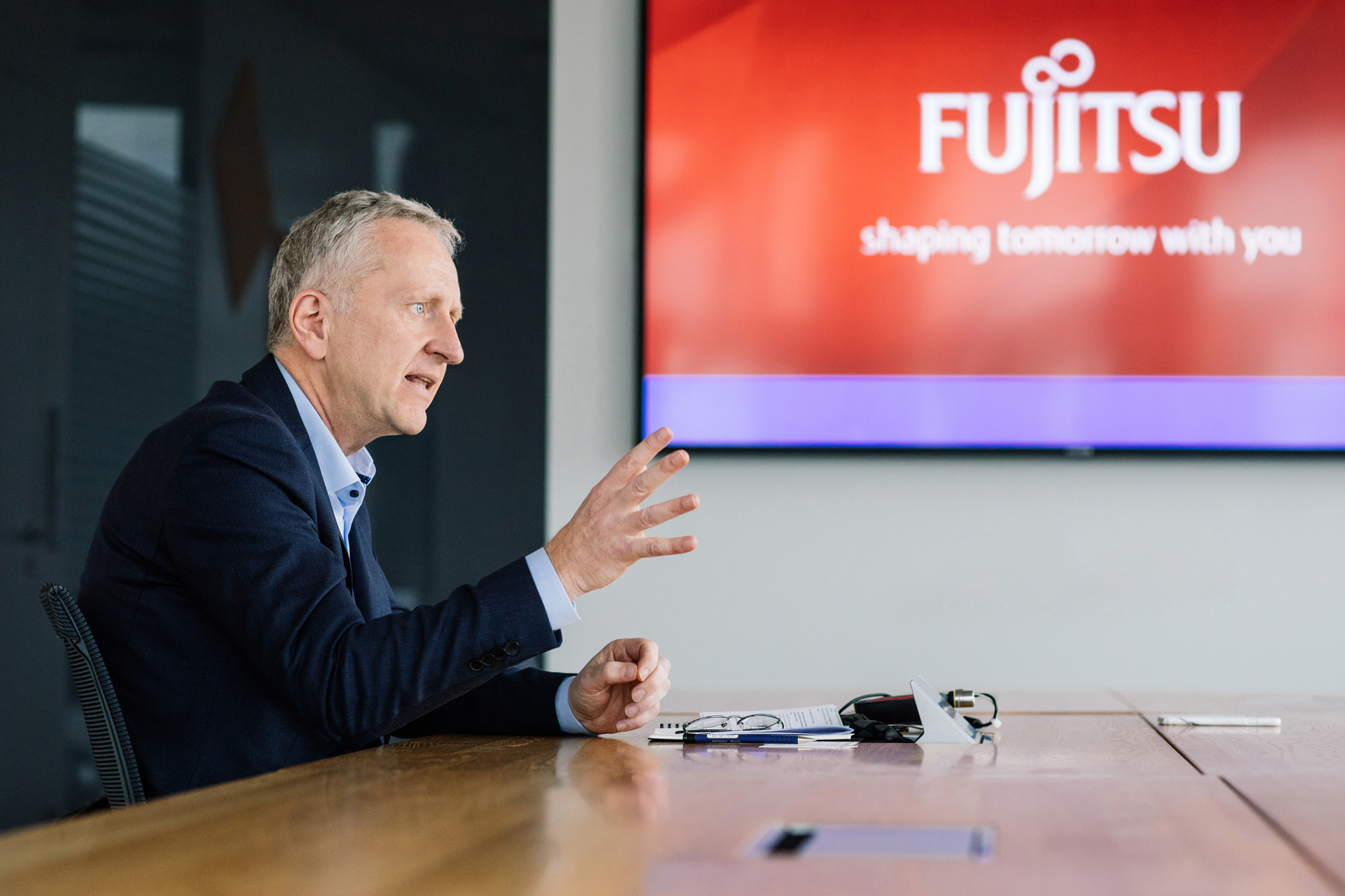
J-BIG: How does the exchange between Japan and Germany work at Fujitsu?
Rupert Lehner: There is a lot of exchange in both directions. Here in Munich alone, we have about 80 expats from Japan at any given time. These visits are very important to help Japanese colleagues understand the „overseas“ market. On the one hand, they see how customer requirements differ from home. And on the other hand, they experience first-hand that Fujitsu as a brand simply does not have the same status in Europe as it does in Japan. There, Fujitsu is omnipresent because of its size and market penetration – some of the colleagues at headquarters just can‘t fathom why we would have to do advertising and communication activities in Europe! And when I tell immigration officers upon entry to Japan that I work for Fujitsu, it often leads to a deep bow. Our market position here in Europe is definitely different from that. Plus, it is very interesting for our Japanese colleagues to see the customer setup we have here in Germany. For example, while we work for many large global corporations, we also have a very strong SME business.
On the flipside of this, we are also very interested in bringing German or European employees to Japan. Although there has been some progress in recent years, it is obvious that much more could and should happen here. I know from my own experience how valuable it is to get to know the mentality of the headquarter colleagues. At the moment, however, far fewer „overseas“ employees go to Japan than the other way around. We will work on that.
J-BIG: At the moment it is rather difficult to travel. What else has COVID-19 changed for you?
Rupert Lehner: When it comes to home offices, we have always been quite flexible here in Europe. The change in culture was greater at headquarters. There, Fujitsu recently proclaimed a „work life shift“, but in Germany, 30-40% of our colleagues worked from home even before COVID-19. In terms of technology, we were well prepared – I guess being an IT company, we have certain advantages here. In times like these, companies show their true colors, and I think there’s a lot we have done right. This is also why, fortunately, we have so far been able to manage without any short-time labor.
Nevertheless, we are of course feeling the effects. One of our major customers is Lufthansa, for example – their difficult situation has also left its mark on us. And there have been changes in our internal cooperation, as well. For example, we have learned that many meetings that we thought absolutely needed to be face-to-face also work very well as a video conference. Even when we at some point reach a „New Normal“, we would like to keep some of these new structures and reduce travel, for example.
But when we take the intercultural aspects in the exchange with Japan into consideration, we also clearly noticed how important personal exchange is. As good as our technical possibilities are today, they cannot convey all those interpersonal nuances. This is also why, in the time before COVID-19, we started to bring more customers to Japan – for example to attend the „Fujitsu Forum“, which took place in Tokyo every year in May. This has helped customers understand us and our culture better, with a positive effect on the customer relationship. So I will definitely go back to Japan as soon as it is possible again.
“When it comes to portfolio development, for example, Japanese companies often think much more long-term.”
J-BIG: What positive aspects of the company‘s Japanese culture are visible to customers here in Germany?
Rupert Lehner: First of all, the Japanese have a very high standard of quality. Both on the infrastructure and on the services side, customers can simply be sure that they will receive top-notch quality. And those same high standards apply to data protection issues, as well – a topic that is very relevant for many European companies. And then there is the Japanese preference for long-term thinking. Of course, we also have to think in business quarters, but when it comes to portfolio development, for example, Japanese companies often think much more long-term.
The consistency that comes with that even extends to HR development: In the last fiscal year, we hired 700 employees with a focus on the service sector, and we intend to invest even more heavily in this area. Now, you might think that COVID-19 would be putting a stop to this for the time being, but the opposite is the case. Our President Takahito Tokita says: „We need these employees even more now, because these issues will become all the more relevant.”

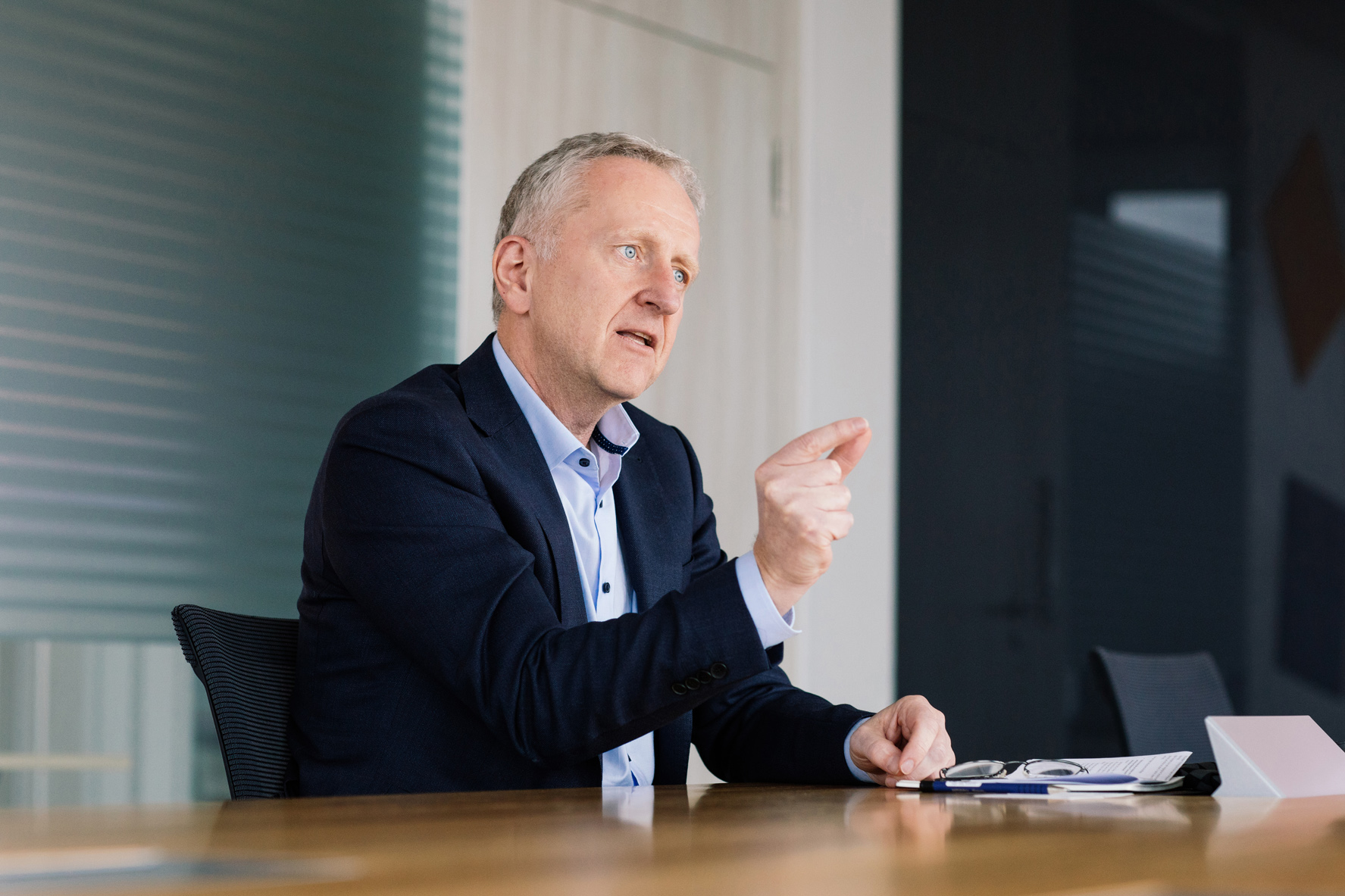
J-BIG: Are there also points of friction between the Japanese and European culture?
Rupert Lehner: One issue that comes up regularly is the speed of decision-making. In the Japanese mentality, decisions are often not made right away; things are questioned over and over again. On the one hand, this means that when a new product enters the market, its quality is 100 percent tried and tested. Others might perhaps already make the leap once 80 percent of the issues are resolved. But on the other hand, quick decisions can simply be an important factor, especially in the IT industry. Finding the right balance here is crucial. To some extent, we can compensate for this with the considerable autonomy we have here in Europe. Our „Innovation Hub“, for example, where future topics are at times approached in a more experimental way, has been spun off from the organization.
However, I must also say that this approach of taking decisions very carefully, never rashly, can be very positive. The mainframe business is a good example of this: People have been ringing its death knell for decades now, but it is still an important and highly in-demand business for us. We have done well to stick with it.

J-BIG: You are a pioneer in many areas of digitization. Nevertheless, when Germans hear the name “Fujitsu”, they often automatically think laptops. Does that bother you?
Rupert Lehner: First of all, I would stress that there are some differences here across Europe. In Ireland, for example, Fujitsu is known almost exclusively as a service company. There are historical reasons for this. In Germany, the connection to Siemens is particularly present – first strongly connected to the desktop and notebook business, and later also to the server and storage business. That‘s why we are still better known as an infrastructure provider here, although today more in connection with data centers than with end devices. Nevertheless, we do still have the challenge of positioning ourselves even more strongly towards our future topics.
This does not mean that we will no longer be doing any infrastructure business in the future, but we are investing heavily in the digitalization and service area. We must become even more visible around these issues, also in the general public. We actually already have a lot of great projects and references here, but we are perhaps not tooting our own horn enough – the typical Japanese restraint.
J-BIG: How would you like to change this public image?
Rupert Lehner: There are of course various tools at your disposal when it comes to communication. One central approach that we want to strengthen in the future is to become more visible among university students again – also an important issue with regard to recruiting. In the past, many of these „young talents“ knew us from the consumer sector. When we left the B2C business, these ties naturally broke off. We want to change that.
That‘s why we recently established an endowed professorship at the TU Hamburg for the next ten years – the first in Germany dealing with the topic of combinatorial optimization and digital annealing. And there are also other projects, like the Winter School we are organizing in cooperation with the LMU and TU Munich.

J-BIG: The „Fujitsu Way“ is also frequently mentioned in the company’s communication. What is meant by this?
Rupert Lehner: This term describes our future strategic orientation. One central term in this context is „human-centric“, but the whole topic of social responsibility is also a part of it. This has always been very important for Fujitsu; it is an integral part of our DNA. For instance, I remember environmental considerations already playing a major role in hardware manufacturing at Fujitsu 25 years ago. As a global company, you simply have a certain social responsibility, and this insight strongly informs our daily business, as well.
Even when tough decisions have to be made, I have always seen Fujitsu’s management put employees first. When jobs have to be cut, a solution that is acceptable to everyone is sought. In the current economic climate, such an emphasis on social responsibility is not always a matter of course.

J-BIG: Last but not least, and with all your experience in a Japanese company: Under what conditions would you recommend Japanese companies to become active in Germany?
Rupert Lehner: Basically, I would say that Germany is one of the first markets to address for any Japanese company that wants to become active in Europe. For the whole topic of automotive and manufacturing, Germany remains a key market within Europe. After twenty years of working with Japanese colleagues, I can also say this: Despite the cultural differences, there are many similarities in the way German and Japanese people think and approach issues – for example, when it comes to quality. This may make it easier for Japanese companies to gain a foothold here.



